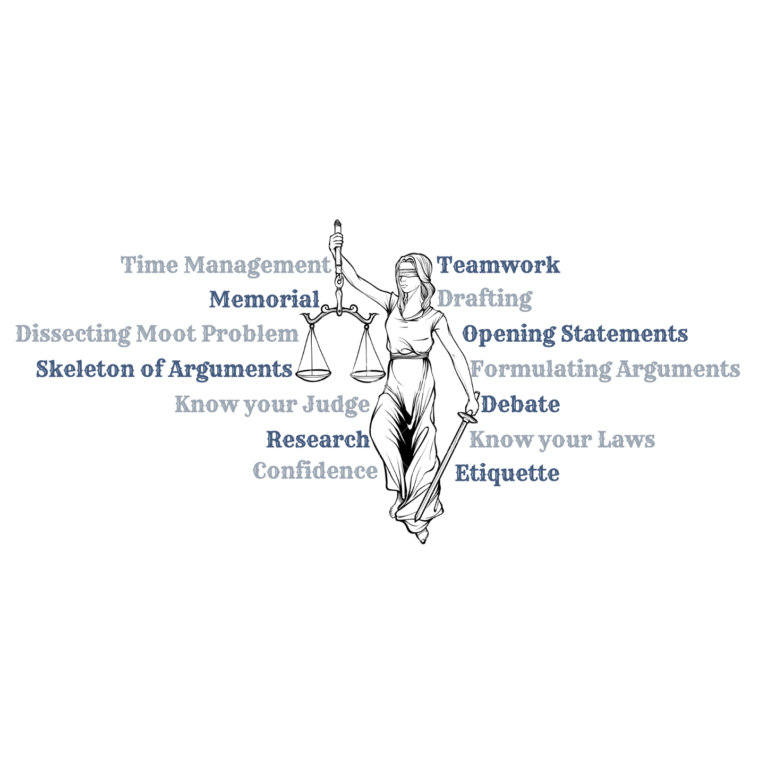
Mooting: a small yet important step for your professional development
25 August 2022
Introduction to Mooting
A moot court is a courtroom practice in which participants referred to as ‘mooters’ or ‘mooties’ argue legal issues before a panel of judges. The goal of a moot court is to encourage analytical thinking through the preparation of and participation in legal arguments.
Legal arguments require making a compelling case by identifying the issue; examining the relevant case law and statutes; identifying any factual disputes; drawing the relevant inferences; and finally, analysing the case and the law to arrive at a conclusion.
It is an opportunity for students to become engaged in the legal process and learn lawyering skills such as research, fact gathering, writing, drafting, and developing legal arguments.
A moot court competition consists of the following four stages, which help the students develop a variety of different skills.
(1) Reading the moot problem
Reading the moot problem is the first step a mooter must take in a moot court competition. Reading may seem simple, but because moot problems are so complex, it might be challenging to understand the moot problem after a simple reading. Creating a chronology is one method that can aid a mooter in completely understanding the moot problem. The chronology is designed to briefly document the facts or events as well as the questions to be investigated.
Additionally, in order to become familiar with all the parties and their roles in the moot problem, the mooter may also develop a dramatis personae. The dramatis personae and chronology would assist the mooter in organizing the events and jotting down the facts outlined in the Moot Problem.
Reading the moot problem every day is crucial to succeeding in a moot court competition.
(2) Research
After reading the moot problem, the mooter will begin conducting research in preparation for writing the first draft of the memorial. The research should be focused on law, case law, journal articles, books, commentaries, etc.
(2.1) Research on the applicable laws
When conducting research, it is essential to understand the aim and function of the law. The mooter should seek to understand the purpose of the law, and the sphere of application.
After reading and understanding the law, the mooter is to apply the law to the facts of the moot problem.
(2.2) Research on case laws
When researching for case law, it’s crucial to determine how the case will be applied to the facts. Whether the case is required as precedent, to explain the law, or only as persuasive authority.
The mooter must ensure that the case’s fundamental contention is still valid when conducting case research and keep current cases that are relevant to the topic in mind.
To succeed in a moot, the participant should use cases to support both sides of the issues in question and should create one-page summaries of the key cases for ease of reference.
(3) Writing the memorial
The mooter can begin writing the memorial, also known as a memorandum, while conducting research. The mooter’s primary objective when writing the memorial should be to systematically and logically lay down the client’s argument in writing.
Different moot court competitions have different restrictions on page numbers, font size, page margin, spacing, footnotes, references, etc. Therefore, it’s crucial to read through the rules of the specific moot court competition in order to understand the format on which your memorial is to be based.
While writing the memorial, the mooter is to deal with the issues one by one by explaining the facts, then applying the law or the policy to the facts.
(4) Oral advocacy
Before the oral arguments, the mooter is required to give their introduction. The mooter should also provide a case theory after the introduction to explain the client’s case in a few words.
While presenting the main arguments, it is crucial to provide sign posts and show the road map in order to make it easier for the judges to understand the layout of the arguments.
The mooter should demonstrate their level of understanding, knowledge, research, and advocacy abilities when responding to questions from the panel of judges.
A good mooter is someone who can properly present their several layers of arguments in an understandable manner while managing their time.
Importance of mooting
Mooting is significant for several reasons. For one, mooting helps students learn valuable writing and research skills. The process of researching and preparing a memorial allows students to master a variety of legal research methods and legal writing skills. Students also develop strong critical thinking and analysis skills as they prepare and present their arguments before a panel of professionals.
Secondly, mooting provides students the opportunity to develop and practice the skills necessary to give effective oral presentations. Students learn about effective techniques for organizing and presenting information. They also learn how to respond to questions from the judges in a responsive manner.
A great way for students to grow their network of contacts both inside and beyond the law school community is through mooting. Networking with fellow law students and legal professionals leads to an increase in knowledge as well as a confidence boost. Networking encourages the development of strong leadership and interpersonal skills that will serve the students well in their careers as lawyers.
Finally, mooting is an opportunity to gain experience that will bolster a student’s resume. By participating in moots, students show their dedication to extracurricular pursuits that complement their chosen career. It also demonstrates significant abilities and experience that will appeal to potential employers.
Conclusion
From start to finish, the mooting journey involves doing research, developing arguments, and preparing a presentation of the findings in a clear and concise manner. Through the whole process, students learn to develop and demonstrate skills that are essential to succeeding in law school and in the practice of law.
Useful Links
Editorial Team

Suma Ilyas
Author
